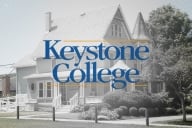You have /5 articles left.
Sign up for a free account or log in.

Hobart and William Smith Colleges in New York is one of the institutions seeking accreditation from NECHE.
Andrew Markham/Wikimedia
Five New York colleges and universities are looking to the New England Commission of Higher Education for accreditation, and if it is granted, they could become some of the first institutions to receive the stamp of approval from an accrediting agency outside their region.
Rockefeller University, Gerstner Sloan-Kettering Graduate School of Biomedical Sciences, Cold Spring Harbor Laboratory and Richard Gilder Graduate School of the American Museum of Natural History need to find a new accreditor soon, because their former accreditor, the New York State Department of Education, is leaving the business. All four institutions lie outside NECHE’s traditional accreditation region.
But NECHE was nearby, proactive and felt like the right fit, said Alexander Gann, dean of Cold Spring Harbor Lab’s school of biological sciences.
“They were the most straightforward,” Gann said of NECHE. “They actually came and visited so that we could spend the day talking to them and they could really get to understand what our institution is and how it operates.”
The fifth New York school, Hobart and William Smith Colleges, is seeking oversight by NECHE because it feels a strong affinity with the other institutions in its accreditation zone.
Accreditation is essential for colleges and universities, because without it, their students cannot access federal financial aid. Barring that access, institutions often see their enrollment languish and they struggle to stay solvent.
Only recently have regional accreditors even been able to consider institutions outside their predetermined list of states. In 2020, the Trump administration reversed a rule that gave regional accreditors a monopoly over their predefined area, effectively removing the distinction between regional and national accreditors and allowing the regional agencies to compete with each other. The change was met with opposition from the regional agencies and optimism from the national accreditors, which have for years been viewed as second-tier to the regional agencies.
“We were not particularly in favor of this change. This change was not driven by us; it was driven by the administration at the time—Trump and [former Education Secretary Betsy] DeVos,” said Larry Schall, president of NECHE. “I think we were the fourth of the six [regional accreditors] to make the decision to open up” to institutions outside the region.
Few, if any, institutions have jumped from one regional accreditor to another since the rules changed, Schall said. The small migration to NECHE is likely the tip of the iceberg for accreditation changes to come. A bill currently sits on Florida governor Ron DeSantis’s desk that would require public institutions in the state to switch accreditors at the end of each cycle, which typically lasts five to 10 years. If the bill is signed and implemented, all Florida institutions will be seeking a new accrediting agency within the next decade.
But NECHE will not likely be a contender, Schall said.
“We have no interest in having someone join us for a moment,” he said. “We would not have interest in pursuing any of those Florida publics that are being forced to make these moves.”
While administrators at Hobart and William Smith Colleges are happy with the current relationship with the Middle States Commission on Higher Education, the typical accreditor for New York State, they note that the college has a prior relationship with NECHE and would fit in better with the New England agency’s institutions.
“The types of schools that are a higher proportion of the NECHE population—which is also a smaller set of schools—are more similar to us, and so it seemed like a logical move to align with them instead,” said Joyce Jacobsen, president of Hobart and William Smith.
Under a new process that NECHE created for accredited institutions looking to switch, Hobart and William Smith is seeking a five-year accreditation term with the agency. After that, the college will go through a more intensive accreditation-renewal process.
“For institutions that were already accredited, it doesn’t make sense to treat them as if they were a brand-new institution having never been accredited,” Schall said. “Our process for brand-new institutions takes five to 10 years.”
Despite now being in competition with other regional accreditors across the country, NECHE will not alter its standards, Schall said.
When the new rules were first implemented, there was some concern that institutions “in trouble with their current accreditor will go shopping for another, and it would result in the lowering of standards,” Schall said. “Our commission was very clear that we would not be interested in anybody that had any issue with their current accreditor.”
Hobart and William Smith and Cold Spring Harbor Labs still have a ways to go before becoming formally accredited by NECHE, but the processes are well under way. Cold Spring Harbor Labs has a site visit planned for the spring, and Hobart and William Smith is awaiting a September vote during which the agency will decide whether or not to accept the college.
“We’ll see what happens in the fall,” Jacobsen said. “We feel good about our work with [Middle States] and our work with NECHE, and they’re both strong accreditors, and we appreciate what they do."








